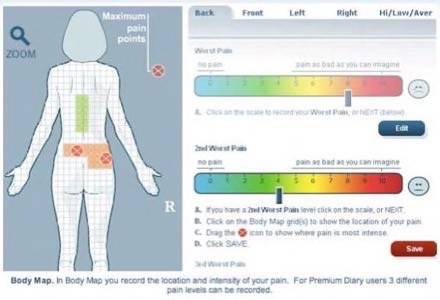Editor’s note: last week the Health 2.0 Conference was held in San Diego – see our review. Josh Rosenthal, founder of Sprigley, was also there and in this post he identifies some of the health web apps that caught his eye, plus trends that were discussed.

ReliefInsite is a site that allows people to map, monitor and analyze their pain. It drew perhaps the most attention at the conference.
ReliefInsite

One other buzz-worthy app was Pharma Surveyor, which helps people understand and personalize their medication regimens.
On Call Medical Group isn’t so much of a tool for consumers, as a group of doctors making house calls who happen to use nifty tools.
And of course, there were a host of community sites – some focusing on doctors and services, like Vitals and HealthGrades, and others focusing on treatments and information like WEGOHealth, Trusera and CarePages. Others were somewhere in between, like MedHelp.
Now that consumer and web companies like Google and Microsoft have climbed in the ring, there’s a definite cool factor in health 2.0 – as evidenced by Adam Bosworth and Esther Dyson being in the room. The fact that Adam’s new venture, KEAS, is in the healthcare space should speak volumes to anyone wondering if this whole thing is for real.
Health 2.0 Trends
A few trends coming out of the conference. First of all, employers are currently driving the show. ‘Consumer owned healthcare’ isn’t quite here yet. Just like with financial services and the 401k, early adoption will come through employers. Next trend: corporations and pharma are getting into social networks. And that’s causing tension. People participating in grass roots sites like Matthew Zachary‘s I’m Too Young for This, selected by Time Magazine as one of the Top 50 Websites (2007) are very sensitive to the ‘big corporation’ ethos and it often repels them. If a social networking site attempts to integrate drug ads, they’ll have to be very, very careful; a point made by members of various online communities and Zarachry himself.
Final trend of note: Google and Microsoft. Many great ideas about health care fail. The system is complex; heavyweights are entrenched. Google and Microsoft represent a threat to some and an opportunity to others. In either case these two Internet heavyweights in health will be something to watch over the course of the next year.
Written by Josh Rosenthal, Ph.D., founder of www.Sprigley.com and a speaker at Health 2.0









